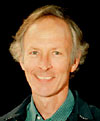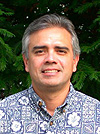The Alexander von Humboldt Foundation has chosen Robert Coe and James Zachos, both professors of Earth and planetary sciences at UC Santa Cruz, to receive Humboldt Research Awards this year. The award is conferred in recognition of lifetime achievements in research and provides support for the recipient to carry out research projects in cooperation with specialist colleagues in Germany.
Zachos will be working with colleagues at the University of Bremen to continue his research on global warming and the linkage between Earth's climate and the carbon cycle. In particular, they will evaluate carbon cycle dynamics, ocean acidification, and carbon sequestration, using prehistoric episodes of ocean acidification as case studies. These rare events involved the relatively rapid release of large masses of carbon into the atmosphere, triggering global warming.
Coe will spend fall quarter this year working with colleagues at Ludwig-Maximilians University in Munich to study "geomagnetic superchrons." These are unusually long periods of time when Earth's magnetic field did not reverse its polarity. The geologic record shows that the magnetic field has changed directions many times--about five times per million years on average during the past 20 million years. Superchrons, however, can last tens of millions of years; the most recent lasted from 121 million years ago to 84 million years ago.
"Why the field stops reversing for such long periods of time is still not known, but it seems likely that superchrons signal special conditions in Earth's lowermost mantle that may have significant geological manifestations on the surface," Coe said.
The Humboldt Foundation grants up to 100 Humboldt Research Awards annually, each valued at 60,000 euros.




